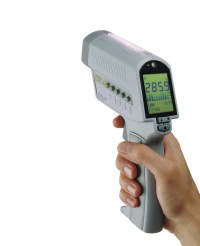 Non-Contact Temperature Thermometers Non-Contact Temperature Thermometers
-
For use in many applications
-
Checking for hot spots in electrical panels, circuit
breakers, generators, and gearboxes
-
Monitoring supply and return registers, air stratification, and duct leakage
-
Food preparation and storage
-
Industrial predictive and preventative maintainance
-
Checking for icing and deicing on planes and asphalt
-
Checking for depleted refrigeration media
-
Cold storage and Walk-in Refrigeration applications
-
Frozen food safty and processing
-
ISO 9000 preoactive maintainance programs
-
Checking for bearing failures and motor misaligment
-
Power distribution trouble shooting
-
Electrical bench work in the shop or lab
 pdf_files Spec Sheet pdf_files Spec Sheet
Rayngerís MX Series lets you hold the future of Non-Contact Temperature Thermometers in your hand. The MX features an optically matched coaxial laser sight system designed to precisely and accurately outline the target measurement area. Improved optics (D:S 60:1) permits temperature measurement from any distance. The bar graph display automatically charts the last 10 temperature points using maximum and mini-mum temperature values to determine the range. The locking trigger allows continuous temperature monitoring.
Available in a selection of models, the MX2 Non-Contact Temperature Thermometers is the standard model. The MX4 is Rayngerís high performance model that accepts K&J thermo-couples, thermistors (NTC); power input and allows for data output. The MX4+ includes Windows compatible data management software, a thermocouple K probe, and RS232 computer cable and a plug-in power supply. A table of 30 preset materials emissivity listings are easily accessed on both the MX4 and MX4+. The MXsz (subzero) and MXCF (close focus) are designed for specialized applications requiring the measurement of very low temperature targets or extremely small ones. These are available in the MX2, MX4 and MX4+ configurations.
Standard with the MX4+ Non-Contact Temperature Thermometers, and available as an option/accessory with the other models, is graphing software that enables the user to organize, display and print temperature and time data; store data points; record continuous or manual single-points; program time intervals, temperature scales and limits; customize log locations, and display both contact and infrared temperatures.
|

